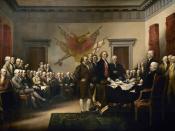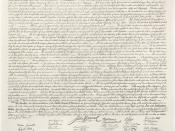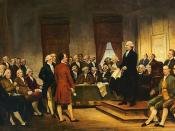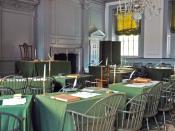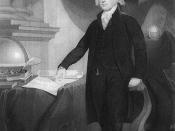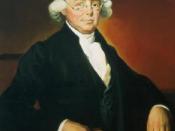James Wilson Position Paper James Wilson was an important figure in the Constitutional Convention. His views and ideas were incorporated into the Constitution and helped to build the foundation of this country. His emphasized view of republicanism and representation contributed to the creation of an astounding government. He and other significant figures of the Convention shared views that helped reinforce the success of the Constitution. James Wilson is an obvious motive for what the Constitution is today.
James Wilson was born in Fifeshire, Scotland on 1742. He studied law, logic, and rhetoric at Edinburgh, St. Andres, and Glasgow. His education allowed him to become a successful lawyer and a prestigious man. He became a tutor after immigrating to the United States and later received his Masters degree. He studied at John Dickinson's law office until he was admitted to the bar one year later. Under the guidance of many highly educated professionals such as Dr.
Blair and Dr. Watts, he shined as a lawyer and was well known. Because of his fame, he was elected to the Second Continental Congress where he signed the Declaration of Independence. He was also appointed to the Constitutional Convention in 1787 and became one of six men to sign the Declaration of Independence and attend the Constitutional Convention. He was appointed many other government jobs until his genius atrophied due to old age. He died in Edenton, North Carolina on 1798.
Many of James Wilson's philosophical views are well expressed and well explained in few of the documents that he composed. In his document entitled "Of the Natural Right of Individuals," he explains and reasons his views on representation of individual man. He strongly believed that the purpose of the government's existence is for the people. In that document, he asks "Does man exist for the sake of government? Or is government instituted for the sake of man?" The apparent answer to this question, government is instituted for the sake of man, strongly supports his views on people's freedom. In the same document, he wrote "⦠by the municipal law, some things may be prohibited, which are not prohibited by the law of nature: but equally true it is, that, under a government which is wise and good, every citizen will gain more liberty than he can lose by these prohibitions. He will gain more by the limitation of other men's freedom, than he can lose by the diminution of his own." This simply means that man will benefit rather than be harmed if they reside by a few laws. Wilson shared his views in the Constitutional Convention where he was given much credit.
Wilson's contribution to the Constitutional Convention was significant and only second to that of James Madison. His plan of an ideal government was an anti-federalists one. Madison recorded Wilson's statement: "â¦nothing but a great confederated Republic would do for it [America]." Wilson's ideal was that people should be attached to the national government rather than having the states controlling the national government. He wanted the national government to be controlled by the people as well because he believed it would create a more favorable system for the people and reduce dissent. Wilson said during the Convention: "There is no danger of improper elections if made by large districts. Bad elections proceed from the smallness of the districts which give an opportunity to bad men to intrigue themselves into office." His attempt to achieve his goal of a republic consisted of him expressing his views on what power the central government should have. Wilson enforced the belief that each leaders and representatives of each branch should be chosen by the people. If they are chosen otherwise, the branches would conflict each other and therefore cause problems. He noted "If we are to establish a national Government, that Government ought to flow from the people at large. If one branch of it should be chosen by the Legislatures, and the other by the people, the two branches will rest on different foundation, and dissensions will naturally arise between them." Wilson also had a view on state power. Wilson stated "The power of the States, I apprehend, will increase with the population, and the happiness of their inhabitants. Unless we can establish a character abroad, we shall be unhappy from foreign restraints, or internal violence. These reasons, I think, prove sufficiently the necessity of having a federal head. Under it the advantages enjoyed by the whole union would be participated by every State." Wilson believed that a central government is required but the states should retain their rights. The states, however, should have rights in accordance to their population and power as well as level of happiness.
Wilson was a strong supporter of representation. He believed it is necessary for a working government to absorb, and then respond to the people's opinions. Instead of attending to each individual person, he held that representatives would display the people's opinions. Wilson stated that "Representation is made necessary only because it is impossible for the people to act collectively." at the Convention. He thought that if the representatives expressed the people's views, the government and society would bond together and grow closer. In his speech during the Convention, he said "For representation, Sir, is the true chain between the people, and those to whom they entrust the administration of the government." During the debate regarding whether voting rights should duplicate those of Britain, James Wilson stated: "I think, in drawing this broad and general inference--that, in the United States, this right is extended to every freeman, who, by his residence, has given evidence of his attachment to the country, who, by having property, or by being in a situation to acquire property." He meant that those who have interest in the country and can prove it should have the right to vote. He strayed from British standards and set standards that would qualify more people to vote. Another figure who provided similar ideas to those of James Wilson was George Mason. James Madison wrote "Mr. Mason argued strongly for an election of the larger branch by the peopleâ¦" "â¦.recommend such a system of policy as would provide no less carefully for the rights of the lowest than of the highest orders of citizens." James Wilson was an advocate of Mason and this particular view.
Wilson believed that the national government should have the ability to impose taxes to pay off debts of the nation as he said at the Convention: "Certainly, Congress should possess the power of raising revenue from their constituents, for the purpose mentioned in the 8th section of the 1st article; that is, 'to pay the debts and provide for the common defense and general welfare of the United States.'" Instead of the states generating and imposing taxes, the national government would directly impose the taxes. He believed that this will better regulate and generally lower the taxes and perhaps ease the anger exerted by the citizens whenever taxes are imposed. "I think I may venture to predict that the taxes of the general government, if any shall be laid, will be more equitable, and much less expensive, than those imposed by state governments." James Wilson included that statement in his speech in the Convention.
Wilson believed that the country can and should benefit from trade. To do so, he believed that the government should have a right to regulate foreign trade that the states currently controlled. Madison recorded a statement about Wilson: "Pennsylvania exports the produce of Maryland, New Jersey, Delaware and will by and by when the River Delaware is opened, export for New York. In favoring the general power over exports therefore, he opposed the particular interest of his State. â¦.It was his opinion that a power over exports might be more effectual than that over imports in obtaining beneficial treaties of commerce" Wilson opposed slavery and expressed that at the Convention. He displays his opposition against slavery in his document entitled 'Of the Natural Rights of Individuals.' In this document, he states "I come now to examine the relation between a master and his servants. Slavery, or an absolute and unlimited power, in the master, over the life and fortune of the slave, is unauthorized by the common law. Indeed, it is repugnant to the principles of natural law, that such a state should subsist in any social system." He realizes that slavery is not commendable and that it is unlawful and against the law of nature. He included in his Philadelphia Ratifying Convention about the 1808 seize of slave trade, "I consider this as laying the foundation for banishing slavery out of this country; and though the period is more distant than I could wish, yet it will produce the same kind, gradual change, which was pursued in Pennsylvania." The relationship between today's government of the United States and Wilson's ideas are clear. He contributed many ideas to the Constitution to create what it is today. His position on many of the issues was ingenious. His moral belief and logic allowed him to contribute and become a founding father.
